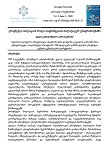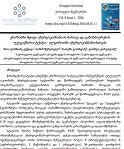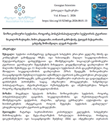Rendering of the Verbs and Verbals of Saying in the Georgian Versions of the Books of the Minor Prophets
Downloads
It is well known that the Septuagint Greek is characterized by the use of more than one (as a rule, two) verbs and verbals (participles) of saying before the direct speech, which is a Hebraism, for instance: καὶ ἀπεκρίθη Αμως καὶ εἶπεν πρὸς Αμασιαν …] Then answered Amos, and said to Amaziah… [Amos 7:14]. The aim of the given paper is to analyze the issue of rendering of the verbs and participles of saying into Georgian. With this aim, I have compared the old Georgian translation/edition (X-XI cc.) of all the twelve books of Minor Prophets with the Georgian version of the Hellenophile period (XII –XIII cc.). Observation of the Georgian versions of the Bible has proved that the earlier translator takes more account of the nature of the Georgian language. Therefore, the old versions of the Bible occupy a somewhat intermediate position between the formal and dynamic translations, whereas the translator-revisor of the Hellenophile period tries hard to preserve formal-structural or semantic equivalence with the Greek language.
Downloads
Ziegler, Joseph (ed). Jeremias – Baruch – Threni – Epistula Jeremiae. Göttingen: Vandenhoeck & Ruprecht. 1976. 504 p.
Ziegler, Joseph (ed). Duodecim Prophetae. Vol XIII. Göttingen: Vandenhoeck & Ruprecht. 1984.
The Computer program Bible Works. Version 10.0.4.216. https://www.bibleworks.com/
Blass, F. and Debrunner, A. A Greek Grammar of the New Testament and Other Early Christian Literature. Cambridge. Chicago, Illinois: The Cambridge University Press. The University of Chicago Press. 1961. 263 p.
The electronic edition of the academic text of Old Georgian versions of the Georgian Bible: http://www.bible.ge/Manuscript/2win.htm
Mirotadze, Natia. The Influence of the Biblical Translation on the Postpositional System of the Georgian Literary Language. Oriental Languages in Translation. IV. Krakow. 2013. pp.179-187.
Danelia, Korneli. mxaţvruli enisa da sţilis zogierti saķitxi bibliur çignta ჳveli qartuli targmanis mixedvit [Certain Issues Related to the Literary Language and Style Based on the Old Georgian Translation of the Biblical Books]. Narķvevebi Kartuli samçerlobo enis isţoriidan [Essays on the History of the Literary Georgian Language]. I. Tbilisi: Tbilisi State University Press. 1998. pp. 443-500.

This work is licensed under a Creative Commons Attribution-NonCommercial-NoDerivatives 4.0 International License.


























































































































































































































